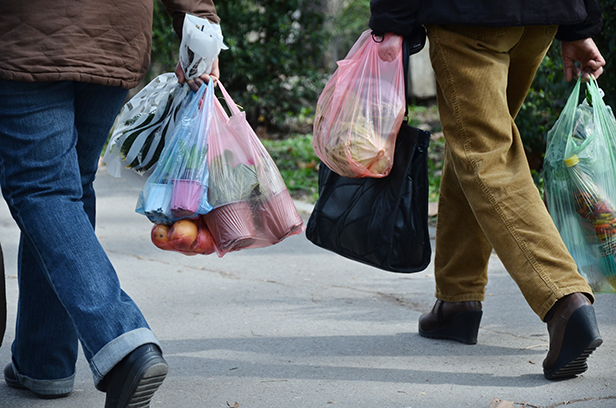February 12, 2021
Plastic Bag Bans Pick Up Again
The prohibitions could help promo distributors struggling during the pandemic.
The push for plastic bag bans is regaining momentum after slowing down in 2020.
Several states, cities, counties and even universities are pushing for plastic bag bans in an effort to improve the environment. That could be a boon to promotional products distributors struggling during the pandemic, as the prohibitions could lead to opportunities to sell more branded reusable alternatives, such as tote bags.

On Thursday, Feb. 11, George Washington University announced that it will be eliminating single-use plastics from campus, The Washington Post reported. The ban will apply to plastic water bottles, cutlery, candy wrappers and bags that can overwhelm landfills and clog local waterways. Furthermore, university departments, student groups and guests will be prohibited from selling or giving away certain plastics, including beverage bottles and utensils. The university said it will work to incorporate eco-friendly options like reusable straws and snacks with compostable wrappers.
With an enrollment of nearly 28,000 students, according to U.S. News & World Report, there’s plenty of potential for savvy distributors to offer sustainable alternatives. Other schools such as Georgetown University and the University of Montana are also pushing for a similar ban on single-use plastics.
In addition, more state governments are considering anti-plastic legislation. Colorado politicians are hoping to not only ban single-use plastic bags and foam packaging at stores and restaurants this year, but also want to remove a state law preventing local governments from banning or restricting certain packaging materials, The Denver Post reported. Meanwhile, Rhode Island legislators are pushing a bill that aims to prohibit retailers from providing single-use plastic checkout bags to customers for the third consecutive year, The Providence Journal noted.
First University in the region to do so. We need more to step up for #PlasticFreeSeas George Washington University commits to single-use-plastic ban https://t.co/vaoorZSCuJ
— Kimberly Warner (@DrKimOceana) February 12, 2021
Elsewhere, however, Philadelphia and Baltimore, which were supposed to implement plastic bag bans in 2020, have delayed their plans until July due to economic hardships caused by the pandemic.
Still, the renewed focus on clamping down on plastic bags has reached south of the border, too. Mexico City banned single-use plastic bags in 2020, and now the commercialization, distribution and delivery of other plastic products, such as straws, disposable plastic cups and balloons, have been prohibited, Deutsche Welle (DW) reported.
Since 2016, eight states – California, Connecticut, Delaware, Hawaii, Maine, New York, Oregon and Vermont – have banned single-use plastic bags. Major cities with such bans include Boston, Chicago and Seattle. In 2019, state lawmakers introduced at least 95 bills related to plastic bags, either outright banning them or placing a fee on them. Ban proponents say the pollution spoils natural habitat and poses a danger to wildlife, which can choke on or become caught in the disposables.
Plastics production was projected to skyrocket before the coronavirus pandemic.
— CPR News (@CPRNews) February 9, 2021
Then as restaurants were ordered to shut down their dining rooms, owners stocked up on plastic bags and containers for takeout.https://t.co/ghqbbQ3vyc via @motarola123
Several plastic bag bans, including trendsetter California’s, were temporarily lifted at the beginning of the COVID-19 pandemic, as certain studies suggested that reusable bags, when not cleaned properly, can become “petri dishes” for bacteria and the like. That led retail, grocery and plastic industry advocates to call on legislators to suspend single-use plastic bans to better protect retail/grocery workers. Last summer, most bans were reinstated.
It took New York six months to enforce its plastic bag ban due to a legal battle brought by Melville, NY-based Poly-Pak Industries Inc. (asi/81350) and New York retailers that distribute those bags. In a podcast with ASI, Ken Trottere, vice president of Poly-Pak, discussed the impact that plastic bag bans have had on business.
In 1950, the world’s population of 2.5 billion produced 1.5 million tons of plastic, according to Surfers Against Sewage, a marine conservation charity based in the United Kingdom. In 2016, a global population of more than 7 billion people produced more than 320 million tons of plastic. The 2016 tally is set to double by 2034. Every day, approximately 8 million pieces of plastic pollution find their way into oceans, according to Surfers Against Sewage.

Product Hub
Find the latest in quality products, must-know trends and fresh ideas for upcoming end-buyer campaigns.